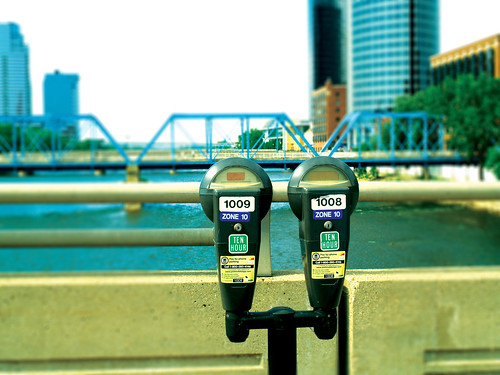When I was in middle school, I distinctly remember a time when I couldn't figure out which version of me to be. A friend was going somewhere with my family, and it was creating a collision of "at school" Brianna meeting "at home" Brianna. In hindsight, the two versions of me weren't drastically different, but during a time in my life when I was trying to figure out who I was and what defined me, they felt enough at odds with each other that I wasn't sure how to handle it.
 |
| Photo Credit: Timo Vijn |
As adults, we probably (or at least hopefully) don't think of ourselves in terms of different versions of ourselves. But if we were to look closely at our lives, I suspect we'd all find an area or two where who we say we are and want to be doesn't always perfectly align with what we actually do. We may post Bible verses and accounts of being #blessed on Instagram, then turn around and commit the same sin over and over without a hint of remorse. We may dole out parenting advice and present our kids as model children, and then secretly wonder why it feels like we're doing everything wrong. We may act like the most productive and knowledgeable employee at the company when we're in a meeting, then go back to our desk and spend the whole day wasting time.
On the outside, the church in Sardis probably looked pretty good. As the letter in Revelation 3 records, they "have a reputation of being alive." Truthfully though, things were very different, as Rev. 3:1 continues with, "but you are dead." It goes on to give them a stern warning:
Wake up! Strengthen what remains and is about to die, for I have found your deeds unfinished in the sight of my God. Remember, therefore, what you have received and heard; hold it fast, and repent. But if you do not wake up, I will come like a thief, and you will not know at what time I will come to you.There aren't many details offered here about how the church in Sardis was dead, but given that they had a "reputation of being alive," there must have been something disjointed about the way they presented themselves versus the way they actually were. In our own lives, it's so tempting, even easy to fake parts of our lives. Putting on a good face may get us through for a while, and we may fool the people around us--our fellow churchgoers, our boss, or even our family. Faking it can breed dangerous consequences as it spills over into our spiritual life though, leading us to believe that we're close to God as long as other people look at us and think we're "good." Of course, we can never actually fool God. He always knows who we truly are, more fully than we even know ourselves.
While the letter to Sardis is rather gloomy, there's also a hint of hope, hope that we can hold onto as well. Jesus instructs the church to remember what they've learned and to hold fast to it, and to repent from the ways they've gone astray. In a word, Jesus is urging them to change. As someone who struggles with change, at first that sounds overwhelming. Jesus sounds pretty urgent, reminding the people that they don't know when he'll come back, so they need to be ready. And while that's certainly true, we do not, on our own, have the ability to instantly stop faking it and become completely new people. Fortunately, we follow a God who is continually at work making all things new. There is urgency, but not urgency to make ourselves instantly better--urgency to turn to the God who works on us to enact the needed change.
Thinking back to younger Brianna, I couldn't tell you exactly when I changed and starting feeling like I could be the same version of me all the time, but I do remember a point in high school where I consciously realized I had reached that milestone. It was a slow melding of the seemingly disparate pieces of myself into the kind of cohesive personality where I could be the same no matter which setting I was in. As with all change though, it's never truly over. We may become more authentic in the way we present ourselves on social media or as parents or as workers, but God always has more he can do to draw us closer to him. The first step is realizing we need him to do it.
[Brianna DeWitt believes in Jesus, surrounding yourself with good people, and that desserts are best when they involve chocolate and peanut butter. She writes about faith, growing up, and whatever else pops into her head on her own blog, and tweets (largely about food) at @bwitt722.]


